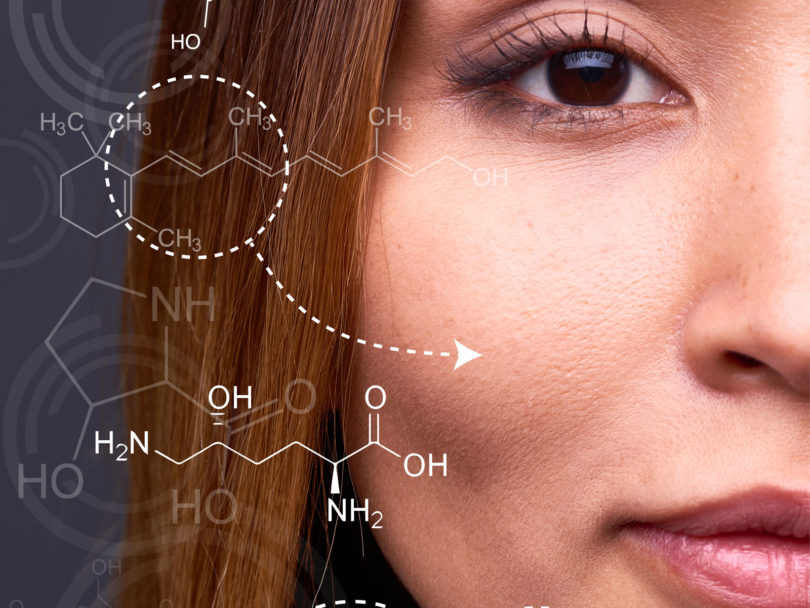This year could be called The Year of Glowing Skin, as skin care products, from sheet masks to serums, are dominating the health and beauty scene.
Now in the limelight? Collagen.
Collagen is nothing new. Although it’s been around for some time, it’s now enjoying a bit of an evolution as it becomes better understood and more accessible. And while historically collagen may have been synonymous with wrinkle fillers and injections, now a growing group of women (and men!) are seeking collagen as the source of a glowing, gorgeous complexion without a doctor’s office or needle in sight.
Indeed, collagen, usually derived from grass-fed cows, chickens, fish and some plant-based sources, is enjoying its moment as the beauty drink du jour, with everyone from health and beauty bloggers to actress Jennifer Aniston herself singing its praises.
But is the hype justified?
First, let’s take a look at what it is. Collagen is a fibrous protein that’s a vital part of your skin’s health, keeping it youthful, elastic and resilient. It’s the most abundant protein in the body and is the main component in skin, bone and connective tissues.
In addition to its skin-beautifying properties, it is also chock-full of essential amino acids that are important in keeping the body functioning smoothly, including sleep-boosting glycine, as well as skin-enhancing proline and hydroxyproline. Collagen also lubricates joints and, according to some, aids in digestion.
As we age, however, our body’s collagen levels begin to fall, which is why cosmetic doctors have been using it as a go-to filler to help erase lines or to create fuller cheeks and lips.
Cosmetic surgery associations aside, collagen has promising holistic beauty and health applications. In fact, a recent study found that supplementing your diet with drinkable collagen peptides significantly increased skin-hydration levels after eight weeks and boosted overall collagen density in half that time.
DID YOU SAY DRINK IT?
The ingestible collagen craze started, as many skin-care trends do, in Asia, where collagen powders, drinks and supplements have been sold for years. In the United States, the craze that had us drinking bone broth to magically heal everything from joint pain to dull hair warmed us up to the idea of drinking our collagen. More recently, beautifying supplements featuring the power protein have been hitting the market.
THE BELIEF
Sipping collagen, rather than applying it topically or injecting it, provides the entire body with the foundational and building blocks it needs to support the creation and repair of the body’s connective tissues. Providing your entire system with collagen can help kick start its developmental abilities again.
Unlike some remedies, it doesn’t matter when you drink your collagen, as long as you get your daily dose. Studies have shown that the fibroblasts — the collagen producers found in our skin — will activate when you consume between 5,500 and 6,500 milligrams of collagen peptides, no matter the time ingested.
And the idea that your collagen supplement will be destroyed or disrupted by digestive acid in the stomach? It’s a myth. Collagen supplements are usually broken down by your stomach acid, with or without food, into amino acids that are then used to build more collagen.
So add some collagen to your morning coffee, or mix some into your lunchtime soup. Don’t expect instant results, but over time, you’ll be pleasantly surprised by what this little protein can do.
WHAT IS THE DIFFERENCE BETWEEN GELATIN AND COLLAGEN?
They are similar, but the difference is in the processing.
Gelatin is cooked collagen that’s been dried and processed into a powder. It will gel when it’s mixed with water. Collagen peptides are processed so the amino acids are broken down, making it easier to digest and more quickly absorbed by the body. Collagen peptides will not gel and are easily mixed into hot or cold beverages and liquids. Both are virtually tasteless and odorless.
HOW DO I GET STARTED?
TIP 1 Choose a drink that fits your lifestyle. For example, someone with a busy lifestyle might prefer a grab-and-go, pre-made beverage. Be sure to pay close attention to ingredients. Some products are made from animal protein, so vegetarians and those with allergies should beware.
TIP 2 Be consistent. Drinking your collagen at the same time may help serve as a handy reminder to get your daily dose. And continue drinking your collagen cocktail for several months. Collagen supplementation is not a quick fix, so it may take some time to start seeing the changes in your skin and body.
TIP 3 Evaluate color and smell. If you’re buying a collagen in powder form, it should be colorless (when mixed with water) and tasteless.



